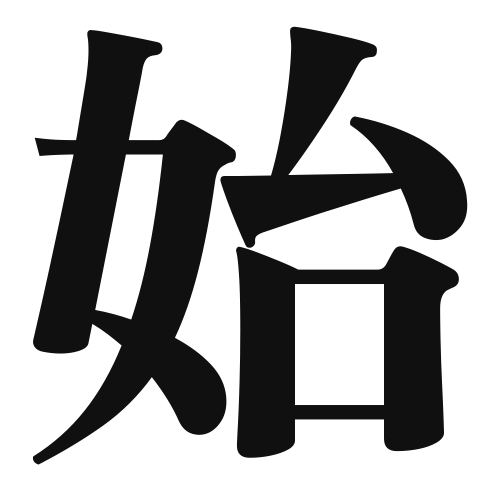1. Overview of Meaning
The kanji “始” (shi) means “to begin” or “to start.” It signifies the initiation of an action or event.
2. Formation and Radical
Formation of the Kanji: The kanji “始” is a compound character that combines elements to convey its meaning. It consists of the phonetic component “始” (shi) and the semantic component “女” (woman), which historically relates to the idea of beginnings, as in the start of life.
Radical: The radical for “始” is “女” (woman), which often appears in kanji related to femininity or beginnings.
3. Examples of Usage
Common Words and Phrases:
- 始まり (hajimari) – beginning
- 始める (hajimeru) – to start
- 始発 (shihatsu) – first train
Example Sentences in Daily Conversation:
- 新しいプロジェクトを始めます。 (Atarashii purojekuto o hajimemasu.) – I will start a new project.
- 春が始まると、花が咲きます。 (Haru ga hajimaru to, hana ga sakimasu.) – When spring begins, flowers bloom.
4. Synonyms and Antonyms
Similar Kanji:
- 開始 (kaishi) – to commence; it emphasizes the formal start of an event.
- 発端 (hotan) – origin; it refers to the starting point of a story or event.
Antonyms:
- 終 (shū) – end; it signifies the conclusion of an action or event.
- 停止 (teishi) – to stop; it indicates the cessation of an action.
5. Cultural and Historical Background
Relation to Japanese Culture: The concept of beginnings is significant in Japanese culture, often associated with new year celebrations and seasonal changes. The kanji “始” is frequently used in contexts that denote new beginnings, such as starting school or a new job.
Proverbs and Idioms:
- 始めが肝心 (hajime ga kanjin) – The beginning is crucial; this proverb emphasizes the importance of a good start in any endeavor.
- 始まりは半分 (hajimari wa hanbun) – A beginning is half the task; it suggests that starting something is a significant part of achieving it.
